The JS Curriculum Experience
1. The JS Curriculum Experience seeks to develop our students as Future-Ready Learners who are Thriving Explorers, Mindful Leaders (School Vision) with the JS Learning Dispositions of Motivation, Appreciation, Resilience and Creativity.
2. The JS Curriculum Experience comprises Subject Learning and Student Development Experiences.
3. Subject Learning is for the following 8 subjects:
1) English Language
2) Mother Tongue Languages
3) Mathematics
4) Science (which begins formally at P3)
5) Physical Education
6) Art
7) Music
8) Social Studies
4. The suite of Student Development Experiences is as follows:
1) ALP (Applied Learning Programme) “Green Explorers @ JS”
2) CCA (Co-Curricular Activities) and PAL (Programme for Active Learning)
3) CCE (MTL) which CCE stands for Character and Citizenship Education and MTL refers to Mother Tongue Language
4) CCE (FTGP) where FTGP stands for Form Teacher Guidance Period
5) Design Education
6) ECG (Education and Career Guidance) including TIDE (Thriving Interest Driven Exploration)
7) Internationalisation Activities
8) Level Signature Events
9) LLP (Learning for Life Programme) “Flourish @ JS: Character Strengths, Mindfulness and Gratitude in Action”
10) NE (National Education) Commemorative Days
11) Outdoor Adventure Learning Cohort Camps
12) Safety Education
13) Sexuality Education
14) Student Leadership Development
15) VIA (Values in Action) including Everyday Responsibilities
16) Wonders of Wellbeing (including Mental Wellbeing and Cyber Wellness)
17) Student Handbook – Individual Activity and Personal Reflection
18) Family Education (Positive Parenting Plan)
5. We adopt a Strengths-Based Approach to Curriculum Design and a whole-school approach to dispositional development, as part of nurturing future-ready learners. This focus on developing dispositions, which are defined as character and performance strengths important for lifelong learning and total wellbeing, intentionally moves the school away from an over-emphasis on examinations and broadens the definition of success beyond marks and grades.
· Every Subject develops subject-specific Performance Strengths in our students, where Performance Strengths are dispositions, attitudes, processes and competencies.
· Similarly, every Student Development Experience develops programme-specific Performance Strengths in our students.
· Holistically, the JS Curriculum Experience comprising Subject Learning and Student Development Experiences nurtures Character Strengths in our students, where Character Strengths refer to the JS BRIGHT Values and JS Learning Dispositions.
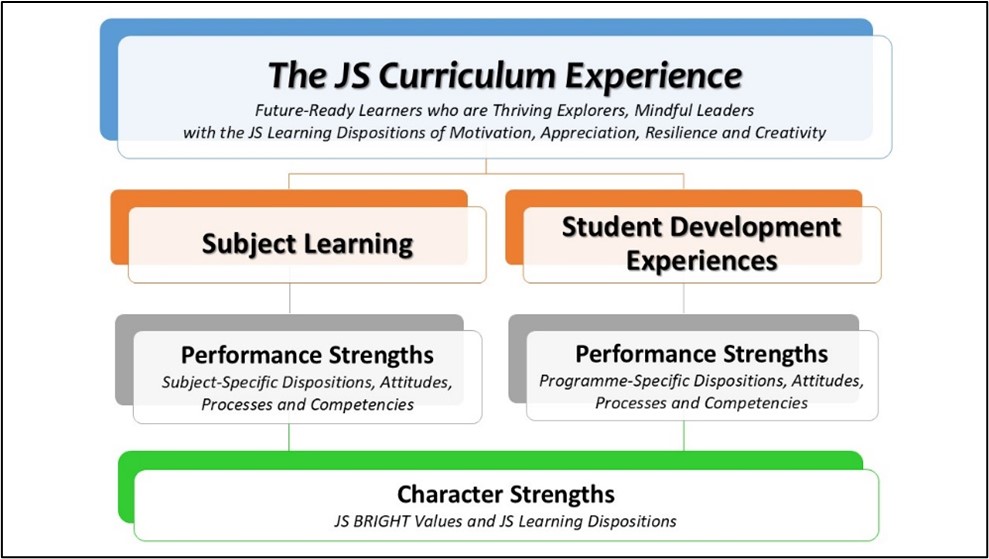
|
|
The JS Curriculum Experience |
Subject Learning
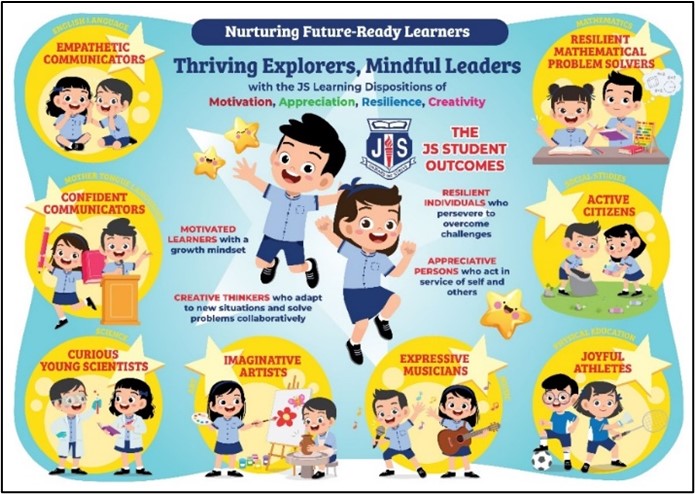
|
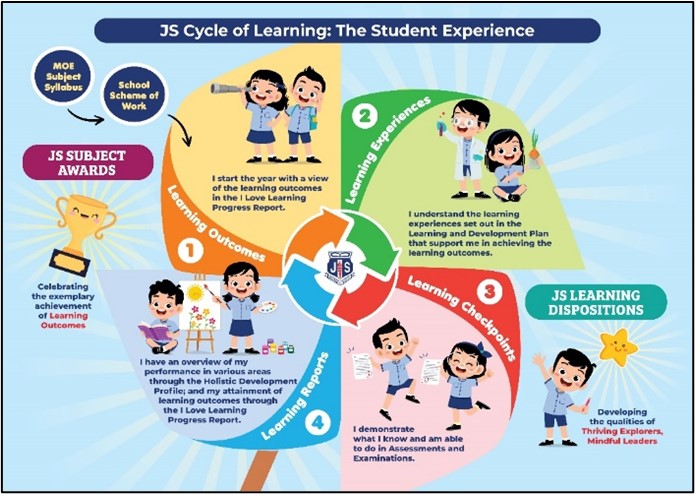
|
|
Nurturing Future-Ready Learners |
The JS Cycle of Learning |
6. Every subject has a definition of a successful learner who is future-ready and a description of the subject-specific strengths in the subject classroom.
|
Subject |
Successful Learner |
Description with Subject-Specific Strengths |
|
English Language |
Empathetic Communicator |
A JingShanite who possesses the values and skills to communicate effectively with confidence and empathy, demonstrates appreciation of the English Language and displays a keen and joyful interest in learning |
|
Mother Tongue Languages |
Confident Communicator |
A JingShanite who participates in the learning of the Mother Tongue Language actively and enthusiastically; and expresses his/her thoughts and ideas in the Mother Tongue Language effectively and confidently. |
|
Mathematics |
Resilient Mathematical Problem-Solver |
A JingShanite who is aware of his/her own thinking processes; enjoys and demonstrates perseverance in solving mathematical challenges; and is able to reason and communicate mathematical ideas logically |
|
Science |
Curious Young Scientist |
A JingShanite who is curious and passionate about learning Science; applies skills and processes in scientific inquiry; demonstrates conceptual understanding in the application of knowledge to real-life situations; and shows care and concern for living things and the environment |
|
Physical Education |
Joyful Athlete |
A Jingshanite who demonstrates a range of movement skills skilfully across different physical activities; demonstrates safe practices in Physical Education independently with respect to self, others and the environment; and displays enthusiasm and joy consistently when participating in different learning experiences |
|
Art |
Imaginative Artist |
A JingShanite who possesses a deep appreciation and curiosity in Art; and strives to express creative and imaginative ideas visually by connecting personal experiences with the world around them |
|
Music |
Expressive Musician |
A JingShanite who possesses a deep appreciation of Music in relation to musical elements and cultures; and has developed a wide music repertoire to perform, create and express themselves confidently |
|
Social Studies |
Active Citizen |
A JingShanite who values diversity in society, actively contributes to discussions, and exhibits curiosity to explore and understand the world |
7. Subject learning follows the JS Cycle of Learning.
a) For each subject, the school is guided by the MOE Subject Syllabus to formulate the Scheme of Work. The school takes into consideration the national directions such as the development of 21st Century Competencies (21CC), the use of educational technology (EdTech) and the nurturing of character and citizenship.
b) Each subject has clear Learning Outcomes which are specific to the subject topics. These are communicated on an ongoing basis to students. There are also Learning Outcomes which are highly related to 21CC development and these are set out specially in the school’s I Love Learning Progress Report (ILLPR).
c) Learning Experiences are designed and implemented to support students in achieving the Learning Outcomes and becoming successful learners in the subject. These Learning Experiences are set out in the termly Learning and Development Plan.
d) Learning Checkpoints provide the platforms for students to demonstrate what they know and are able to do.
· For all subjects at all P1 to P6 levels, the Triangulation Model shows how evidence of learning is collected over time during the Learning Experiences. Students demonstrate what they know and are able to do through their work samples, classroom conversations and learning behaviours.
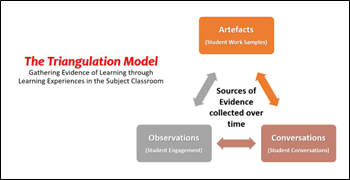
|
|
|
The Triangulation Model |
· For the academic subjects from P3 to P6, the school has a School-Based Assessment Structure that comprises weighted assessments and examinations where students demonstrate what they know and are able to do in the academic subjects.
e) Learning Reports enable students to have an overview of their progress and performance in the subject.
· Learning Reports come regularly in the form of ongoing assignments with teacher feedback, rubrics and checklists. Peer feedback serves as a Learning Report, offering insights particularly into creativity, communication and collaboration. Additionally, self-reflection is a meaningful Learning Report, especially in capturing the learner voice and growth mindset that enhances personal development.
· The Holistic Development Profile (also known as the Report Book) is issued at the end of Term 2 and at the end of Term 4. It focuses on the assessment of subject-specific Learning Outcomes as well as Conduct, Learning Dispositions and Student Leadership Development.
· The I Love Learning Progress Report (ILLPR) is issued at the end of Term 2 and at the end of Term 4. The ILLPR which is focuses on Learning Outcomes related to 21CC Development.
f) At the end of the year, the school celebrates the exemplary achievement of the Learning Outcomes with the JS Subject Awards.
Student Development Experiences
8. Every Student Development Experience (SDE) develops programme-specific Performance Strengths in our students. Specifically, the Learning Outcomes relating to 21CC which are central to the SDE are identified and highlighted intentionally and explicitly to students.
9. The activities for the SDE are planned and implemented for students to demonstrate the central competencies in the SDE. [Learning Experiences]
10. Debrief sessions and reflection activities (self-assessment and peer assessment) engage students in thinking about and discussing their development of the central competencies. [Learning Checkpoints]
11. As students participate actively in the suite of SDEs, they develop the JS Learning Dispositions and Student Leadership, which are assessed by their Form Teachers.
12. A special mention of an SDE is for Level Signature Events which are from the School-Within-School Model. There are three stages of development – Lower School, Middle School and Upper School. Each stage has a learning focus, a developmental spotlight and a tribal story. Every Level Signature Event is aligned with the learning focus and the developmental spotlight and tells the tribal story.
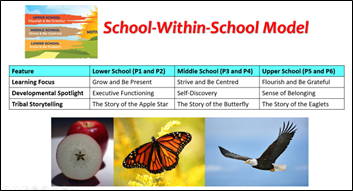
|
|
|
The School-Within-School Model |
|
Growing Thriving JingShanites
13. With the school vision to develop “Thriving Explorers, Mindful Leaders” and the school culture to “Learn for Life, Flourish as One”, growing thriving and flourishing students and ensuring their total wellbeing are an imperative for the school. To this end, the JS Curriculum Experience strives to foster a way of life in the school that empower students to have a sense of wellbeing.
14. The Thriving JingShanites Framework is premised on the PERMA+V Model (from the work of Martin Seligman). This framework has a strong belief that Positive emotions, Engagement, positive Relationships, Meaning, Accomplishment and Vitality contribute towards total wellbeing.
15. The school has developed constructs that are an integrated part of the school’s total curriculum experience, so that students experience wellbeing as a way of life. These constructs such as Gratitude, Mindfulness and Growth Mindset appear across Subject Learning and SDEs.
· Positive Emotions – Gratitude
· Engagement – Creativity and Mastery
· Positive Relationships – Diversity
· Meaning – Mindfulness and Do Good, Feel Good
· Accomplishment – Growth Mindset, Goal-Setting and Celebration of Effort
· Vitality – Healthy Habits
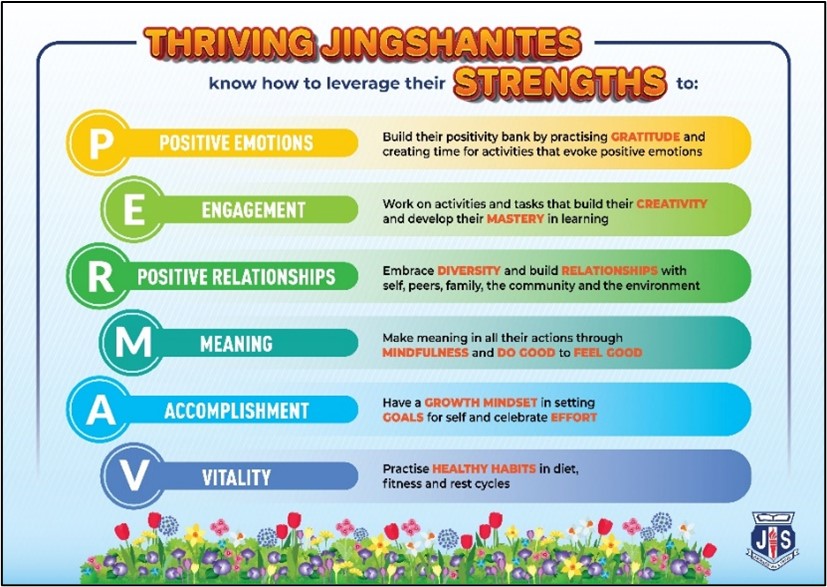
|
|
The Thriving JingShanites Framework |

